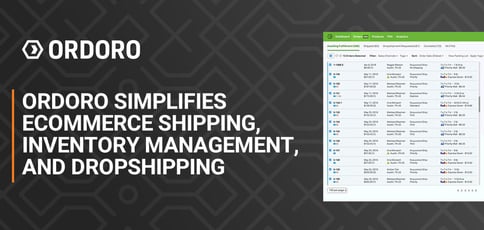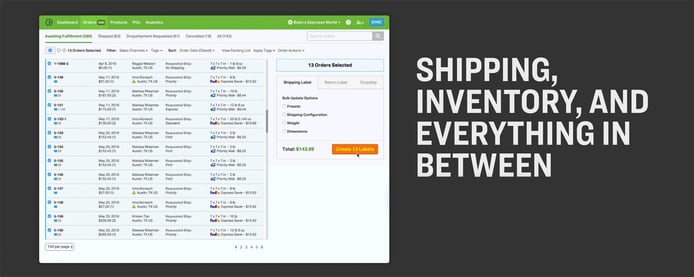
TL; DR: Ordoro is an all-in-one application that helps online merchants manage operations and logistics across all ecommerce and inventory channels, from digital marketplaces to shopping cart software providers and warehouses. Unlike many platforms in the ecommerce space, Ordoro helps ecommerce sellers and site-building teams with the post-ordering experience, which is crucial to customer loyalty. With a central interface for efficient and distributed order fulfillment, Ordoro is furthering its mission to help sellers compete in a rapidly growing online retail space.
Online sellers and retailers place a lot of focus on convincing customers to make a purchase. And many front-end ecommerce technologies exist on the market to help them achieve that goal.
Some empower individuals and businesses to promote products through media platforms and blogs, while others personalize services via promo codes and free delivery. Others streamline payment processing or pull out all the stops to prevent shopping cart abandonment.
These solutions all serve a similar purpose: to boost the all-important conversion rate. But merchants must also optimize the online shopping experience after the customer confirms a purchase. If they don’t, they’ll be hard-pressed to find returning customers.

Ordoro, co-founded by Jagath Narayan, helps ecommerce sellers and site-building teams create a seamless post-ordering experience.
“We see a lot of merchants going through that — they spend a lot of time upfront, building the site and driving traffic, which is important,” said Jagath Narayan, CEO and Co-Founder of Ordoro. “Unfortunately, it’s not good enough to have a site that’s attracting traffic and selling products. Your post-order capture, the whole fulfillment experience, is part of your brand’s overall value proposition.”
That’s where Ordoro comes in. The all-in-one inventory application helps online merchants manage their ecommerce operations and logistics across all channels. In addition to boosting operational efficiency and shipping speed, the solution gives online retailers a fighting chance to thrive in an ecommerce landscape dominated by industry giants.
“You can differentiate yourself by fulfilling the promises that you made to your customer at the time they placed the order,” Jagath said. “That’s a critical piece of the customer experience.”
Turning Attention to the Post-Ordering Ecommerce Experience
Jagath launched Ordoro in 2010. At the time, front-end ecommerce platforms were hitting their stride, and online sales were increasing. Since most of the growth revolved around platforms focused on the pre-ordering experience, Jagath knew there was a massive opportunity in the post-ordering space.
“Companies like Amazon, BigCommerce, Shopify, and Magento were taking off — that’s where all of the noise was,” he told us. “It was clear that as ecommerce continued to grow, there would be a need for good software to come in and help out with the backend of ecommerce. That was the idea upon which we launched the company.”
The Ordoro team first focused on solving two significant pieces of the fulfillment problem — shipping and inventory.
“When an online retailer gets an order, there are a lot of questions they need to answer, including how heavy the package is, where it is going, how fast you need it to get there, and what carrier is the cheapest,” Jagath said. “Our platform is designed to make recommendations using an advanced rules engine.”
The second piece of the fulfillment puzzle is inventory. Merchants don’t always fulfill inventory from their own warehouse alone. With Ordoro, they can manage all of their inventory channels (marketplaces, web stores, and suppliers) in one app that includes multiple warehouses. Such sources may consist of a small business owners’ garage, Amazon-managed fulfillment, or a drop shipper. The solution also makes it significantly easier for developers on website-building products to implement backend fulfillment features.
“Ordoro is a central hub for inventory, giving you visibility into your stock levels across every warehouse and all these sales channels and keeping everything in sync,” Jagath said. “What we bring to merchants is a world-class order fulfillment platform that solves all their needs.”
Enabling Efficient Order Fulfillment from One Interface
Today, Ordoro features a wide range of inventory and shipping management solutions, all accessible through a single pane of glass. The company’s barcode scanning feature, for example, minimizes errors by scanning each product within a single order to ensure that every item is accounted for.
“Barcode scanning is essential when it comes to quality assurance — you must ensure that the items you’re packing in the box match with the order,” Jagath said. “These are all very small things, but they’re the things that matter when working to improve the quality of order fulfillment.”
Brian Everett, Senior Account Executive at Ordoro, said the company’s goal is to create one interconnected system that allows merchants to boost the accuracy and efficiency of their fulfillment process.

Ordoro is a one-stop shop for all your inventory and shipping needs.
“It all ties into the customer experience — not just getting packages out, but getting them out accurately, whether it’s through barcode scanning or order verification throughout the process,” Brian said. “Ordoro is an entire ecosystem that allows brands to be more accurate, efficient, and proactive with their time, and all the tools they need are under one roof.”
The company works tirelessly to stay one step ahead of emerging ecommerce trends. Jagath told us he’s seen a spike in dropshipping, a form of online business where a merchant accepts customer orders but does not keep the products it sells in stock. Sellers typically leverage one of two dropshipping models.
“One is somewhat of a get-rich-fast scheme, where you set up a web store with a bunch of products and direct all of them to the manufacturer,” he said. “But dropshipping is not just limited to those kinds of players. I’ve seen merchants use dropshipping to strike a deal with a manufacturer in the same space and expand their product portfolio.”
Empowering Online Sellers to Compete with Industry Giants
According to Jagath, an effectively distributed inventory is another trend in the fulfillment space.
“Rather than fulfilling everything out of one warehouse, you want to decide the best place to ship it out,” he said. “You might have a bicoastal strategy with warehouses in New York and Los Angeles. Orders from the East coast ship from the New York warehouse, while those from the West coast ship from Los Angeles. The benefit is that you are getting the product to the customers quickly.”
There are also more advanced approaches. Retailers with brick-and-mortar stores across the country may choose to ship orders out of local stores. Others use storage, packaging, shipping solutions such as Fulfillment by Amazon (FBA), which relieve business owners of fulfillment burdens.
“Distributed inventory is how Amazon is able to get certain products to you by the next day,” he said. “I think that’s the way the industry is going to evolve. I see a lot of smaller merchants want to get into that model in the future. And we are helping them do so. Obviously, there are logistical challenges that they need to solve in terms of the warehouses, but software-wise, intelligent order routing is something we already do very well.”
As a company, Ordoro frequently receives word-of-mouth referrals, which Jagath attributes to the team’s prioritization of customer feedback.
“ I think one of the reasons why we keep getting these repeat referrals is that when we release a new feature every two weeks or so, we send out a feature release email,” he said. “We often get positive responses from customers saying ‘This is something I asked for, it’s amazing that you guys listened,’ or ‘Thank you for creating something we needed before we even thought of it.’”
New Features to Ease High-Volume Fulfillment
Site-builders, take note: Moving forward, Ordoro will continue building new and innovative products, including tools for vendor collaboration.
“Sharing information is an essential aspect of distributed order fulfillment,” Jagath said. “We have a prototype of a vendor portal that would allow a partner to log in and have a restricted view of your orders — only the data that matters to them. You control which order should be shared with the supplier.”
The company is also working to serve the needs of high-volume customers who may ship up to half a million packages a day. “At that volume, the challenges you’re facing are different. We continue to add features to close gaps for these bigger customers and fulfill their needs. We have a lot of good things happening on the product side.”
HostingAdvice.com is a free online resource that offers valuable content and comparison services to users. To keep this resource 100% free, we receive compensation from many of the offers listed on the site. Along with key review factors, this compensation may impact how and where products appear across the site (including, for example, the order in which they appear). HostingAdvice.com does not include the entire universe of available offers. Editorial opinions expressed on the site are strictly our own and are not provided, endorsed, or approved by advertisers.
Our site is committed to publishing independent, accurate content guided by strict editorial guidelines. Before articles and reviews are published on our site, they undergo a thorough review process performed by a team of independent editors and subject-matter experts to ensure the content’s accuracy, timeliness, and impartiality. Our editorial team is separate and independent of our site’s advertisers, and the opinions they express on our site are their own. To read more about our team members and their editorial backgrounds, please visit our site’s About page.

